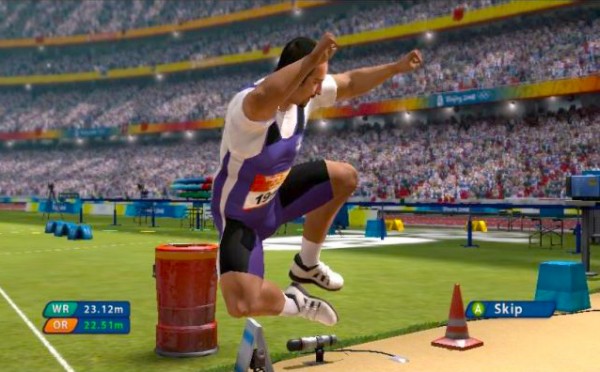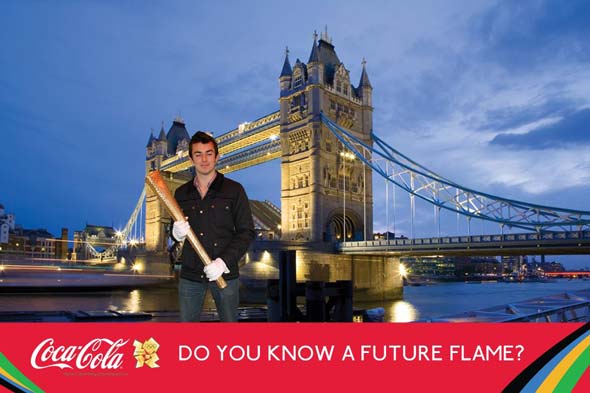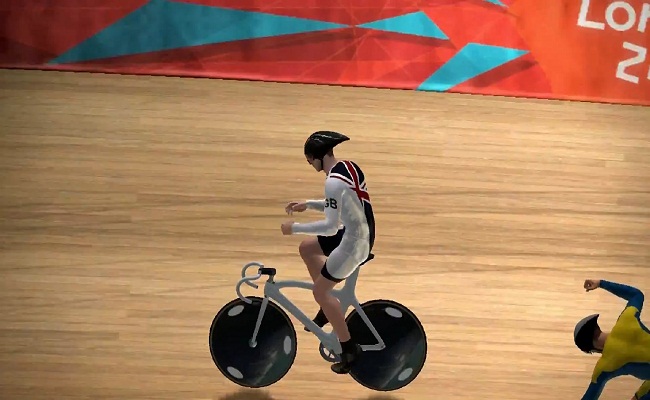Let’s face it; Beijing 2008 wasn’t actually that bad. While it hardly rivalled the quality of games that were being produced at the time (2008 being a year which brought us GTA IV, LittleBIG Planet and Fallout 3), it did possess some truly addictive gameplay elements thanks – on the whole – to its solid presentation and style. Fast forward four years and we’ve arrived at SEGA’s official London 2012 Olympic Games title, a videogame brimming with up to forty-five authentic playable events, customizable options, online play, leaderboards and a dedicated multiplayer – and while you can’t knock their Olympian value for money, worries are that this may be a rehash of something we’ve already seen before…
I’ve had the privilege of holding the 2012 Olympic Torch (feel free to gawp at the gormy picture of me at the bottom of this review) and much like the £400,000 logo, the tickets lottery, the failed hurdles qualifier, the raised price in local rent, the lack of Beckham in Team GB, Danny Boyle’s silly farm idea and now the Official London 2012 Olympic Games videogame – it was ultimately a bit of a let-down. Note how I slipped in the videogame alongside the other notable failures there? That’s because this seems to be the most comprehensible way for me to convey my opinions towards this particular Quadrennial entry – an attractive emblem that’s surprisingly underwhelming as a whole.

The main bulk of the game will be usual fare for veteran Olympic games players (the videogames that is, not the actual events – unless Hussein Bolt you’re reading this again in which case keep your stupid comments in your pocket!) so instead of my traditional review approach, I’m going to focus on what makes this one stand out from the rest, because for lack of originality SEGA’s Australian development team really have gone to extensive lengths to whet the appetites of gamers looking to give this a real go.
Presentation has always been key for games of this calibre. Whilst London itself may not look particularly attractive, the graphics of London 2012 are colourful, vibrant and authentic – and with fully realized stadiums and grounds being used throughout the online and offline campaigns (a trick recently used by FIFA’s EURO 2012 expansion, in which grounds like Kiev were virtually recreated and debuted before the television coverage began) there are plenty of things that’ll please gamers aesthetically about SEGA Aussie’s approach. To bolster that positivity, commentary is provided by the fantastic duo of BBC reporter Seth Bennett and Scottish ex-netball and hockey athlete Allison Curbishley. They do a great job of replicating the enthusiasm they undoubtedly will portray once the games actually begin and this is tied very cleverly into live in-game play. On the flip side, there is a cheesy American commentator who also covers events which the two famous pundits don’t – and whilst I can tell he’s there for padding, he does a fine job too.
Gameplay takes a significant leap forward from 2008 in so much that it’s not all about button-bashing anymore, but when there are so many events to cover for such a big occasion (forty-five in total) there’s a sad realisation that over half of them are poorly handled; ,merely uninspired, repetetive mini-games used to pack out the disc. These offer little replay value for some strange reason, as they feel more taxing to load up and play instead of feeling addictive and challenging. Some of the more undemanding games are entertaining though, such as sprinting and cycling, as they often arrive as welcome breaks to rest from the stress and pressure you feel when tackling quick-time-event or tactical events such as diving or archery. All of these modes also come with some form of multiplayer (either online or offline) which I’m very pleased about, and some customizable options including a “party mode” (where you and your friends can tackle challenges together or indeed fight head to head) are very welcome in my eyes – as they encourage a positive sense of camaraderie as opposed to merely just timewasting to bulk out the game or tick the boxes.
The game struggles to cope with all of this though; load times are poor, athletes are unlicensed and a subsequent domino knock-on effect is then had for most areas of the game. For an ultra-competitive scoreboard or trophy junkie this game is definitely right up your alley, but for most people the basic mini-game approach really lacks any overall entertainment value. Unlike the charming Super Mario Party, the Olympics games will forever be restricted by the need for authenticity – the burning desire to look, sound and smell like the real thing. It’s just a concoction designed to serve as a collector’s item for hardcore Olympics fans and sadly for most others it provides very little. It doesn’t really work (or at least it doesn’t work at a £30 price tag), but that’s not to say it’s the worst entry to the series. If you know what you’re letting yourself in for and you’re used to previous games in the series, then this may turn out to be one of your favourites. For me, the flame has physically and metaphorically burned out – and unless an authentic events mini-game game can ever let itself go and provide fully immersive, entertaining content to gamers without ridiculous load times and repetitive approaches then I shan’t be looking forward to many more of these. Oh, and don’t get me started on the Kinect support…



0 Comments